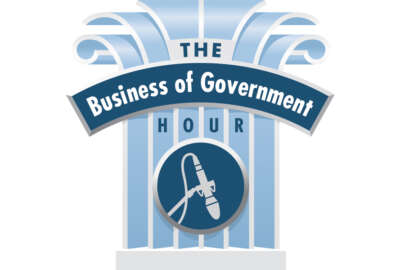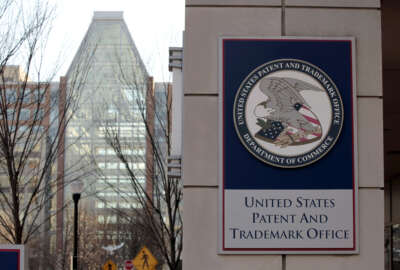At least one thumbs up for President Biden’s Patent and Trademark Office nominee
President Biden has nominated Kathi Vidal, an experienced patent attorney, to become director of the U.S. Patent and Trademark Office. One group says she's a good...
Best listening experience is on Chrome, Firefox or Safari. Subscribe to Federal Drive’s daily audio interviews on Apple Podcasts or PodcastOne.
President Biden has nominated Kathi Vidal, an experienced patent attorney, to become director of the U.S. Patent and Trademark Office. One group says she’s a good pick. Joining Federal Drive with Tom Temin to explain why is Holly Fechner, executive director of a nonprofit group called Invent Together, which seeks to reduce what it calls the patent gap for women and minorities.
Interview transcript:
Tom Temin: Ms. Fechner, good to have you on.
Holly Fechner: Thanks so much for having me time.
Tom Temin: And before we get to Kathi Vidal, let’s talk about your organization Invent Together. I didn’t realize, I have to confess, that patent gap with respect to racial and gender disparities was even a thing.
Holly Fechner: Well, that’s right. The purpose of Invent Together is to ensure that people appreciate that we do have a significant patent gap in this country, and it’s hurting our economy, and it’s hurting the ability of us to succeed in the global economy. And what we’re doing is trying to ensure that we have the research necessary to understand what these patent gaps are, and then to take steps in both the public sector and the private sector to try to close them. The USPTO found that fewer than 13% of people on a patent applicant were women. And even more troubling, we don’t even know accurate figures about people of color, because this information is not collected. So we are dedicated to doing the research necessary to understand this problem. And then to work with universities, other educators and private companies to try to solve this problem.
Tom Temin: Yes, I guess the fact that you can’t quantify easily the racial component of the patent population, if you will, is because they don’t ask that on an application then correct.
Holly Fechner: That’s right. Currently, the USPTO does not collect demographic data on patent applicants, they are able to do research into this area using name matching software. So researchers have basically done backflips to try to get the information that we need. But there’s got to be a better way. The Senate just this summer in June did pass legislation called the IDEA Act that would require the USPTO to collect information on a voluntary basis, and make that information available to researchers so that progress could be made in this area. Invent Together strongly supports the IDEA Act. And we hope that the legislation moves to the President’s desk this year.
Tom Temin: I would think, though, that fundamentally, you want the numbers to rise for minorities, say, because more of them are submitting more worthy applications. Rather than having say some subtle bias built into the granting system.
Holly Fechner: Absolutely. The Patent Office, I think, is well respected in terms of how they evaluate patent applications. There’s many components to trying to ensure that more women, people of color, and other underrepresented groups are inventing and patenting. Many things go into trying to change this dynamic.
Tom Temin: I imagine it backs all the way up to say the urban public school systems where you want to inculcate a sense of wonder or a sense of discovery, and some good STEM knowledge, and good language skills.
Holly Fechner: I think in this country, we’ve we had a history, because the concept of inventing and patenting is actually embedded in our Constitution, and we have had a history where we’ve revered inventors. But I think that’s fallen off. And we don’t focus as much and encourage kids to think about this creative path as a career. So there are many things I think that can be done at the youngest ages. We got some programs on invention education which I think are just terrific and are models for other people to follow.
Tom Temin: And then once they have an invention that’s patented, you have to make sure the PTAB doesn’t take it away and hand it to China or something. But that’s an issue for another day. We’re speaking with Holly Fechner, she’s executive director of Invent Together. And let’s talk about Ms. Vidal, Kathi Vidal, who is a well known corporate attorney. I think she’s with one of the big Silicon Valley offices of William and Strawn. And what do we know about her and why do you feel she’s a good pick?
Holly Fechner: Well, we did, Invent Together, welcome the nomination of Kathi Vidal to be the director at the USPTO. This is an incredibly important institution as part of our government. We are an innovation economy, and innovation really starts with inventions that get patented. And the USPTO, I think, is underappreciated in terms of the role it plays in the economy. Vidal is a highly respected attorney in the patent field. She’s experienced, she’s both been in court on patent issues, but has also counseled many clients over her decades long career. In addition, she’s an electrical engineer. So I think it really helps to have somebody who started from that kind of technical background. We hope that she gets a hearing quickly, and potentially could be on the job by the end of the year.
Tom Temin: And Congress does tinker from time to time with the patent system. I think there was a major reform now probably 10 years ago that gave us that board. Which is controversial and there’s some disagreement over how well it functions. But it was a honest attempt to try to get better at intellectual property protection and generation, if you could prescribe any adjustment to the patent system now based on what you’ve seen, what might it be?
Holly Fechner: Well, we are concerned about diverse inventors losing their patent rights without the ability to defend them. And one, we have seen that the patent board has been used to kill patents at an early stage. So that is certainly a concern. You mentioned the American Invents Act that created this board. And I think the intentions were very good. It was created as a way to try to speed the process and ensure that there was a real understanding about whether a patent was valid early on in the process. But we don’t want a system that treats small inventors and diverse inventors in a way that is not going to allow them to defend the inventions that they created. So that’s a concern and it’s something that that Vidal will, I’m sure, have some thoughts on if she is confirmed.
Tom Temin: Now the administration is seeking to really plus up the budgets of organizations in the federal government it feels can help meet its aims, notably the IRS. Does it look like the patent office, and that’s part of the Commerce Department, but self funded, is adequately funded for the level of patent activity that it’s facing, and the just sheer amount of work it has to do?
Holly Fechner: The patent office is funded by user fees. So the real issue is ensuring that the patent office can keep and have access to the fees it collects. So that is something that we’re always concerned about to make sure that fees are not diverted from the patent office. Tom, I also wanted to mention a really exciting development that just happened yesterday. I am on a working group that the USPTO and the Small Business Administration organized to try to understand the patent gaps and to develop a national strategy to address them. We’ve been working on this for over a year, Commerce Secretary Raimondo just sent a letter to those of us on the working group yesterday saying that she is going to be chairing a council for inclusive innovation. And we’re really excited about this. Because when you think about trying to ensure equal opportunity for women, people of color and other underrepresented groups in this country to invent and patent, we need a national strategy. And having Secretary Raimondo committed to this mission is exciting. And I think Kathi Vital, if she is confirmed, will also be a key player in developing and implementing this national strategy.
Tom Temin: All right. Sounds like things are starting to be on the move again. Holly Fechner is executive director of Invent Together. Thanks so much for joining me.
Holly Fechner: Thank you, Tom. It’s been a pleasure.
Copyright © 2025 Federal News Network. All rights reserved. This website is not intended for users located within the European Economic Area.
Tom Temin is host of the Federal Drive and has been providing insight on federal technology and management issues for more than 30 years.
Follow @tteminWFED





